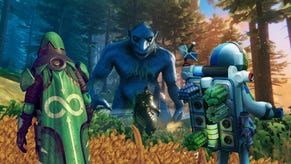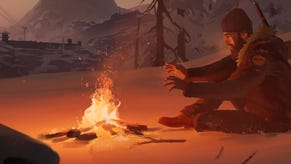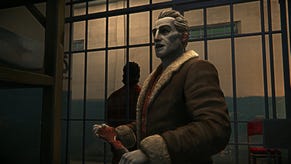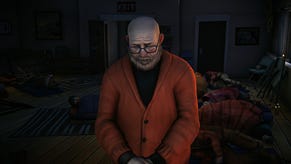The Long Dark is the survival genre at its brutal best
Cold comfort
If I could, I'd attach their heads to spikes and mark out the perimeter of my territory with their blood. The frozen fields are already littered with carcasses, and I'm wrapped in a stinking hide, but it's not enough to keep the wolves at bay. They are wary of me, but their hunger for my flesh is stronger than their fear.
I've been living at Pleasant Valley Farmstead for two weeks but it feels like a lifetime. These are my adventures in The Long Dark [official site], a game which has singlehandedly convinced me that the survival genre has a bright future.
Previously, my attempts to survive The Long Dark hadn't lasted more than a couple of in-game days, but that was a while back, when the game first entered Early Access. I'm not sure if it's easier now or if it's that I got lucky with my starting position, but this is the longest I've ever lived. Two weeks. I started playing on Saturday night and my first character didn't manage to find shelter before dying, frozen and exhausted. My second attempt has been far more successful. I have a home, a large stockpile of wood for my fire, and a freezer full of bear, wolf and deer meat.
I'm playing on the default difficulty setting, though I'm very tempted by the ultra-tough Interloper mode, which sounds brutally apocalyptic with a climate that becomes more hazardous as time goes on, and declining wildlife. For now, though, I'm happy to stick with my current character and that is notable in and of itself.
The opening, when you're lost and in need of shelter and food as quickly as possible, is the hardest part of the game. I imagine the mortality rate in the first few hours is astonishingly high, particularly for players, like me, who have no familiarity with the map, and cannot rely on memory to direct them toward shelter. It feels as if you're being scoured off the face of the Earth by wind and biting ice, and the possibility of ever planning ahead more than five minutes seems impossible.
Now, in Pleasant Valley, I'm planning for the next day and the following week, maybe even a month down the line. I'm gathering supplies and preparing for expeditions. I have preferred loadouts for different types of trip, from fishing to deerstalking, and the lightest of kit for general exploratory work out in the unknown. The farmhouse contains enough food, water and wood to keep me heated, fed and hydrated for a long time, and the medicine cabinet in the bathroom is loaded up with painkillers, antibiotics and bandages.
Usually, when it comes to this kind of sandbox survival game, I either get annoyed when I die early, before I can gain a foothold in the world, or I get bored when I've established that foothold and everything is under control. The Long Dark manages to make both the initial trial and the subsequent moments of safety compelling, and it does that by forcing you to prioritise.
Every moment that you live, you're burning calories, and possibly burning precious daylight or clear weather conditions as well. Rather than rushing around to fill whichever of your meters is running low, be it food, thirst or fatigue, you have time to breathe, to relax and to plan. Once you've found a safehouse - buildings cut off from the open world by a loading screen that establishes them as sanctuaries from the cold and the teeth and claws of nature – the clock isn't ticking anywhere near as fast as it was when you were living without a roof over your head. You don't even have to eat every five minutes, as in so many survival games. Yes, the harsh conditions mean you burn calories faster than I do sitting around browsing the internet all day (New Year's weight loss resolution; get partially eaten by wolves in a blizzard), but if you eat a big hunk of meat before setting out for a day of hiking, you won't need to scavenge berries to survive.
Instead, as you become relatively comfortable in its world, The Long Dark shifts your attention from your own internal stocks of warmth, food and water to the contents of your safehouse. My farmhouse is full of furniture, for example. Lots of lovely wood, ready for the fire. I need the fire to boil water and to cook the meat I bring back from my hunting trips, but the wood is no good to me unless I have a tool to break the furniture down. And so I spent one entire day scavenging nearby barns and outbuildings looking for a hatchet. I returned home emptyhanded, having wasted a day's worth of food and water on the trip, as well as risking hypothermia because I pushed myself too hard and ended up far from home with only a small bundle of sticks to burn.
A setback but one from which I could recover. The next outing took me to the West side of the farm and I found a hatchet in a makeshift workshop inside a large barn. There were medical supplies and other tools as well, so on that trip I came out ahead.
Now I have enough wood to keep the homefires burning for ages. The house also looks less like it was abandoned in a hurry, with beds unmade and cushions scattered on the floor, and more like it has been derelict for decades. The furniture is all gone, and there are piles of wood and raw meat in the corners of the rooms. If I could craft the bones of the wolves into furniture, it'd all look a little bit Texas Chainsaw Massacre. Or maybe the Alaskan Chainsaw Massacre.
I'm doing good. I'm a survivor and I'm fairly sure I can keep on surviving. I'm confident. I can do this.
Except, food, water and fire aren't enough. I'm anxious. I'm terrified. I can't stay here forever. I need bullets.
Every time I go outside, I see wolves. I can't tell if they're actually attracted to the farm and the scent of meat cooking on the fire every night, or if the dead bear frozen out front has drawn them closer, but I see them every day now. Three times in the last five days I've returned home bleeding and limping, my clothes torn and my rifle jammed. The gun won't last much longer and I don't know how to repair it, and even if I did know how to prepare it, I've only got five bullets left.
I've considered making a bow but I don't know how effective it would be and how the hell would I go about making arrows anyway? The gun is comforting, for the sound it makes as much as anything else. Even if I miss, the sound of the shot startles the pack and creates some breathing space. The whistle of an arrow and the twang of a bowstring aren't going to scare the wolves from the door.
It was fear of the wolves that led me to my most foolish misadventure. Before I'd found the hatchet and chopped up all the furniture in the farm, I had vague plans to move on. I'd already discovered one other safe place, on top of a hill overlooking the farmland. It's a signal tower and the building beneath is sturdy, if small, with a bed and a workbench. It's hard to cook there, though, because there's no indoor fireplace, just a barrel outside that is often useless due to strong winds. I'd slept there for a couple of nights and one clear morning, could see the fields of the farm down below, and decided to search the area.
I'd found the farmhouse late in the day, first spotting a red mailbox at the side of an unrecognisable road, buried beneath blankets of snow.
After a few days, I decided to leave again. This was the pre-hatchet days, remember, so my main goal was to find one, but I didn't expect to return to the farm. I had stored up lots of meat and water, but those things could be replaced, and for all its charms, the farm didn't have ammunition, knives or axes. I was still ripping the meat off corpses with my bare hands.
I decided I'd use the signal tower as a landmark, knowing it was close to the farm, and would head back toward it if I hadn't found any other shelter by dusk. It's visible from miles around and as I set off down the road, heading East into territory I hadn't seen before, I felt confident. I'd find a prepper bunker packed with bullets and survival rations, or a settlement with a few small houses to loot. What could possibly go wrong?
Before I'd even crossed the fields and reached the road, I found out. The wind picked up, the snow started to whip around horizontally, decreasing visibility. Unable to see more than a few feet, and deaf to anything but the storm, I should have turned back, but I decided to push on to the road and keep going until the cold had worked its way through the thick layers I was wearing. By the time I'd reached the road, a full-on blizzard had descended and my body temperature was plummeting.
I wasn't even sure I'd be able to make it back to the farmhouse, so I trudged on, looking for shelter. After a few false alarms, in the form of rocks and trees looking into view and briefly resembling either buildings or bears, I saw a car at the side of the road. It wouldn't run, but it would provide shelter form the wind and accompanying chill.
There was an chocolate bar under one of the seats and I ate it as my condition deteriorated. I sat in that car for two hours. Outside, I would have been killed, but in the car I was simply dying, slowly but surely. The weather showed no signs of improving and I had a choice to make – home was too far to reach in these conditions, but there might be something ahead. It was either that or wait for the storm to stop and hope that I had enough energy to crawl home.
I'd rather die on my feet, searching, than sitting on my ass, so I stumbled out of the car and pushed onward.
The road ended shortly afterward. Rocks were scattered across it and it bent to the right, into a frozen river, where the route ended. There was a frozen corpse with some rations, a flare and an emergency stimulant. I had no idea what the long-term effect of the latter might be but this was definitely an emergency so I flipped off the cap and stabbed it into my arm. Or maybe into my heart, like that one scene in Pulp Fiction. Vision blurred but re-energised, I scrabbled around the corpse looking for anything else of use but there was nothing to be found. Not knowing what else to do, I staggered toward the sloping hill to my right, thinking it must eventually lead up to the signal tower, and hoped to find a cave. I had tinder and wood and matches, but no fire could survive in the face of the blizzard.
Visibility was still little more than zero.
After what felt like an eternity of struggling against both the wind and the slope of the hill, I didn't even know which way I was heading anymore. I'd vaguely decided to go 'up', remembering a cave I'd seen on my way down from the signal tower, but either the hill was too steep or I was too weak to climb it. Everything was white and hypothermia had set in. I was dying.
And then, I saw a light. Or at least I thought it was a light. Something stood out in the static of the storm, a glow, a fire, a flare? No.
A red mailbox.
I'd somehow found my way home, though the farmhouse was still some distant away, across the fields. I plunged forward and when I finally reached the door, I was all but finished. I crawled to the fireplace, threw on some of the wood I kept close by, and managed to create warmth and light, and then I passed out on the floor.
A series of bad decisions, beginning with the choice to leave the farmhouse at all, that I was lucky to survive. There is no comfort, cold or otherwise, in The Long Dark because the essentials are finite. It's a survival game in which the whole world seems to be fading, rather than just your character, and Hinterland ensure there's always pressure at your back through a combination of time and resource management, and a somewhat controversial cabin fever mechanic, that prevents long-term survivors from becoming homebodies.
Neo Scavenger aside, this is the best survival game I've ever played. In its current incarnation, it has an extremely solid sandbox mode, with several regions to explore, and enough wildlife to keep things interesting. There are deer and rabbits to hunt, and bears and wolves to steer clear of, and there's plenty of gear to collect. Hinterland seem to have added items and systems when they've figured out what those things will contribute to the game as a whole, rather than packing everything and the kitchen sink into the world and worrying about the purpose afterwards. There is no variety for its own sake, which makes the game less arcane and meandering than many of its genre stablemates.
A story mode is coming and I look forward to it. The sandbox evokes realism rather than mystery, but the occasional musical cues and the weirdness of the emptied world and its brilliant night skies do create a haunting atmosphere at times, which I'd love to explore further. For now, though, I just want to see what happens next, down on the farm, when I make my next foolish attempt to expand my horizons.
However I die, there'll be at least one bad decision leading to the end, and it's that rather than fate that I'll regret as the light fades and the longest dark claims me for good.
The Long Dark is available in Early Access now, via Steam, for Windows, Mac and Linux.


















